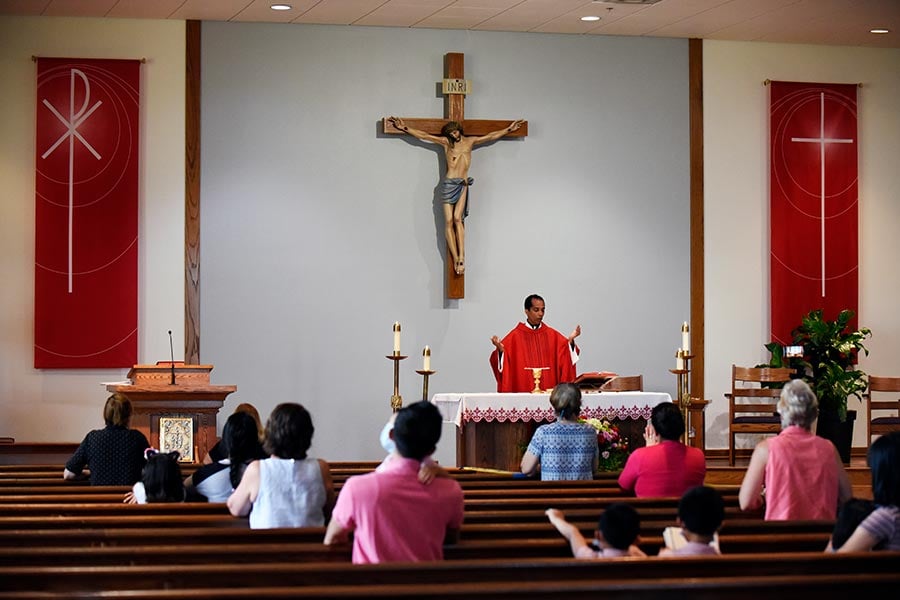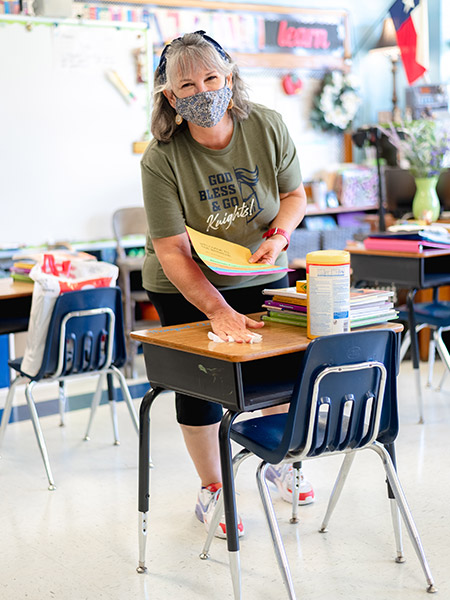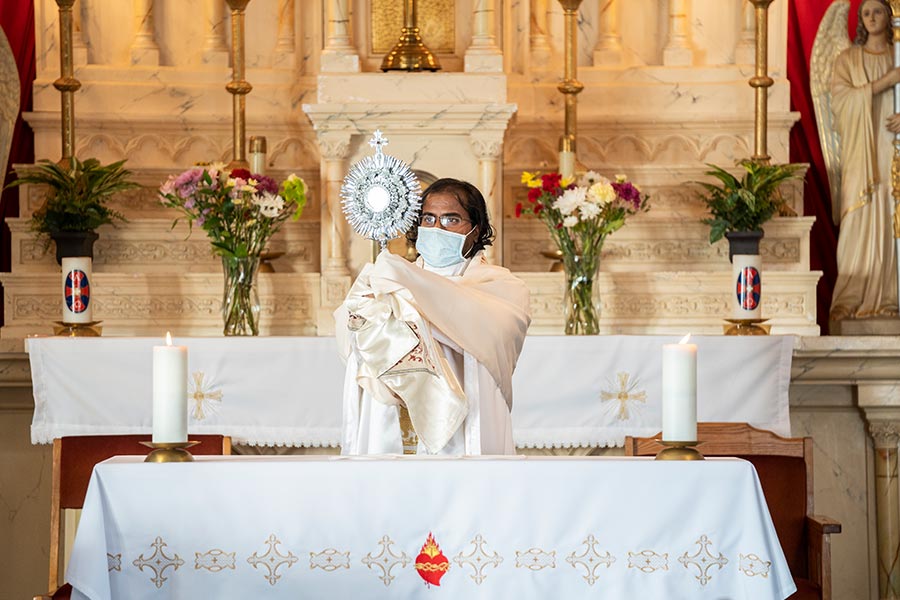The bigger picture: Annual Diocesan Appeal reaches to margins of diocese

Father Joy Joseph celebrates daily Mass at Holy Cross Parish in The Colony. (NTC/Ben Torres)
When Father Joy Joseph, TOR, applied for a parish operating grant from the Advancement Foundation, he wasn’t just thinking about his current parish, Holy Cross in The Colony. He also kept in mind his former parish, Holy Family of Nazareth in Vernon.
The pastor asked for a smaller amount for suburban Holy Cross than in the previous three years, because “I know the rural parishes struggle, especially at this time [of the pandemic]. They might not have online giving. They are hurting financially, so we are better off asking for a smaller amount,” said the Franciscan friar.
That’s the spirit of the Annual Diocesan Appeal — thinking beyond your individual parish to the entire diocese.
Each year, faithful in the Diocese of Fort Worth contribute funds that support the people, programs, schools, and parishes of the diocese as a whole. During the 2020 campaign which ended in June, more than 11,000 families donated over $3.5 million, the largest amount raised in the Appeal’s 37-year history.
More than $1 million of the funds are disbursed to parishes and schools as operating grants through the Advancement Foundation.
For example, Fr. Joseph requested a grant to pay for part of the salary of his director of religious education (DRE). Having a DRE in the parish of 1,200 families means “parents are happy that their children are taught religious education. Every parent wants their children to be growing in faith and knowing Christ and the teachings of the Church,” said Fr. Joseph.
Karen da Costa, the Holy Cross DRE, does much more than coordinate religious education for children. The parish has a lean staff, so da Costa’s responsibilities also include preparing children and adults to receive the sacraments, supervising RCIA for children and adults, facilitating Safe Environment sessions and keeping records, scheduling, and maintaining the parish’s website, Facebook page, and Flocknote account.
With Fr. Joseph’s encouragement, Holy Cross parishioners donated 110 percent of the parish’s goal to the Appeal in 2020. He urged “everyone to be part of the bigger goal. By giving, you can say ‘I am part of the big picture.’”
Last year, 29 parishes received operating grants totaling $873,000. This year, $949,200 will be disbursed among 33 rural or needy parishes.
The Next Generation
If the Church did not hand on the faith from one generation to the next, she would cease to exist.
To provide a solid foundation for the next generation of Catholics, the Annual Diocesan Appeal makes Catholic education a priority. A large percentage of donations fund seminarian education, the formation of permanent deacons, and tuition assistance for families at each of the 19 Catholic schools in the diocese.
This year, 12 of the schools, in addition to tuition assistance, received operating grants, including St. Martin de Porres in Prosper and Notre Dame Catholic School in Wichita Falls.
According to Principal Susan Flanagan of St. Martin de Porres, the grant’s timing was providential. The newest diocesan school, which opened in 2012, received funds to assist with the salary of a full-time nurse.
Until this school year, the front office staff served as the school’s health representative, tracking immunizations and dispensing medication according to instructions, explained Flanagan.
However, a few students had allergies severe enough to require the school to keep EpiPens in case of allergic emergencies. Also, by earning state accreditation in October 2019, the school became subject to more rigorous documentation of immunization records, including the possibility of an audit.
Last fall, Flanagan began looking at the budget to determine if they could hire a nurse. Part time looked feasible, but a diocesan grant would enable the position to be full time.
Then the coronavirus pandemic struck. “It’s a huge weight off of my shoulders to have a knowledgeable medical professional on campus at all times,” said the principal.
In addition to routine scrapes and sniffles, the newly hired nurse will track recommendations and guidelines regarding coronavirus from various public health organizations and the Texas Education Agency.
“There’s all these different scenarios: if someone is in contact with someone; if someone’s sick on campus. You really need someone whose job it is to make sure we’re doing things the right way,” said the principal, who noted health advisories are updated frequently.
For a school still establishing a stable enrollment and financial footing, the support of the Annual Diocesan Appeal is essential.
The principal explained, “The diocese, not only with the grant for the nurse but with the Advancement Foundation’s generosity regarding tuition assistance, really helps us.
“We are so grateful to everyone in the diocese who donates to the Annual Appeal. I don’t know if everyone realizes what a great benefit it is to the schools. Catholic education is an important part of our Catholic faith,” Flanagan concluded.

Academic Success
In addition to $250,000 earmarked for tuition assistance, the Advancement Foundation will provide at least $325,000 in operating grants to Catholic schools, almost doubling the $175,000 given as school operating grants last year.
When school opened for Notre Dame Catholic School on August 10, the Wichita Falls school implemented its plan to restructure the junior high, which was developed over years with input from families, parishes, and the Catholic Schools Office. With a grant from the Advancement Foundation, they purchased a new science and math curriculum for junior high students.
“This is a big plus. It allows us to align our math and science studies from first through eighth grades,” said Daniel Escobedo, president (and alumnus) of Notre Dame. “This strengthens the academic integrity of the program and sets students up for academic success.”
He explained that teaching math and science principles with the same structure over eight years provides repetition that facilitates learning and “gets kids to excel.”
Escobedo acknowledged the “unbelievable expense” of new textbooks, which explains why it’s common for textbooks to be used for 10 or more years, “until they can’t stay together.”
Escobedo appreciates that parents, parishes, priests, Bishop Michael Olson, the Catholic Schools Office, and the Annual Diocesan Appeal have invested in the school, which dates to 1904. “Financially, spiritually, it’s truly a group effort,” he said.
The effort pays off in the years to come, he said. “The future of the Catholic community is in Catholic schools. It’s where the foundation is laid to go on to be faithful Catholics.”
Four Times the Faith
“Televised services will never, never replace being in one’s church and worshipping with others of like faith,” said Ann Mixson of St. John Parish in Strawn. That lesson crystalized for faithful across the diocese during the shelter-in-place restrictions this spring, when Mass was celebrated sine populo (without the people).
For small rural parishes like St. John, not having a priest to celebrate Mass and provide the sacraments has been a reality at times during its 108-year history.
Since July 2018, Father Vijaya Raju Mareedu, SAC, has brought sacraments to St. John and three other rural parishes, thanks to funds donated to the Appeal. (Deacon Ed Ferguson and youth formation staff also benefit from the grant.)
The missionary priest, fondly known as Fr. VJ, celebrates the Saturday vigil Mass in Strawn. On Sunday, he celebrates Mass at St. Rita Parish in Ranger at 8 a.m. Next, he’s at St. Francis Xavier Parish in Eastland at 9:45 a.m., and he’ll arrive at Our Lady of the Holy Rosary Parish in Cisco by 11 a.m. Confessions and blessings may keep him busy until 1:30 p.m. “I never say ‘no’ to that,” said the Pallottine priest.
The pastor embraces the responsibility of four parishes.
He explained that these four parishes are some of the oldest in the diocese, established in their communities a century ago. His parishioners often were baptized, married, and raised their children in that church. “These are faithful, hardworking people,” he said.
Plus, many senior citizens are able to attend only because the parish is nearby, according to Fr. VJ.
Parishioner Mixson concurred, “These citizens are often unable to drive at all or to drive beyond their immediate neighborhoods. Without a church close by, many of the most deserving and devout Catholics would be unable to attend Mass and receive the Eucharist.”
Fr. VJ is especially grateful for the grant this year, during the pandemic, when many are suffering economic loss and isolation. “When the faithful receive the Holy Eucharist, it brings hope. It connects us to God. We receive the sacraments; we receive God; we receive hope.”

Father Vijaya Mareedu elevates the monstrance at Eastland’s St. Francis Xavier Parish, established in 1920. (NTC/Juan Guajardo)
The Reason for our Hope
During this time when many are suffering financial hardship and social distancing recommendations create a sense of isolation, our hope remains constant, said Advancement Foundation Chief Operating Officer Renée Underwood, explaining this year’s Appeal theme: The Reason for our Hope.
“A lot of things change, and a lot of things are uncertain, but Jesus Christ, and what He teaches, and His message — that’s the reason for our hope,” said Underwood. “We always have hope. It’s the one truth. It’s a constant.”
Our hope in Christ inspires us to respond gratefully and generously in service and love. In this time of suffering, looking beyond ourselves brings us consolation and a feeling of gratitude, according to Underwood.
A case in point is Catholic Charities Fort Worth. More people are requesting help from the nonprofit, which will receive more than $300,000 from the Appeal this year. “The needs of the people they serve have grown exponentially,” said Underwood. “The needs are out there. The good and generous and faithful Catholics we have in the diocese will respond accordingly.”
Catholic Charities Fort Worth is a longtime recipient of Appeal funding, along with prison ministry, college campus ministry, retired priests, and marriage and family life ministry. This year, Respect Life ministry, which has always been supported by the Annual Diocesan Appeal, will receive a significant boost over prior years.
With increased material and spiritual needs arising from the pandemic, the Advancement Foundation has added a prayer request form to the reply envelope. The Discalced Carmelite Nuns cloistered in the Monastery of the Most Holy Trinity in Arlington will pray for those intentions throughout the year. Additionally, the intentions will be remembered by Bishop Olson during a special Mass at St. Patrick Cathedral.
Underwood encouraged Catholics to send prayer intentions regardless of whether a contribution is made to the Appeal.
Pledge cards will be mailed to all registered households in the diocese in mid-September, and online donations can be accepted currently at the Advancment Foundation website.
Fr. Joseph, pastor of Holy Cross, summed up his gratitude for the Appeal when he said, “The Annual Diocesan Appeal is a wonderful, wonderful opportunity for everyone in the diocese to reach out to the poor and the downtrodden in every corner of the diocese. This gives an opportunity for everyone who has a good heart to share the blessings they have received from God with someone who is less fortunate or who needs some help.”
